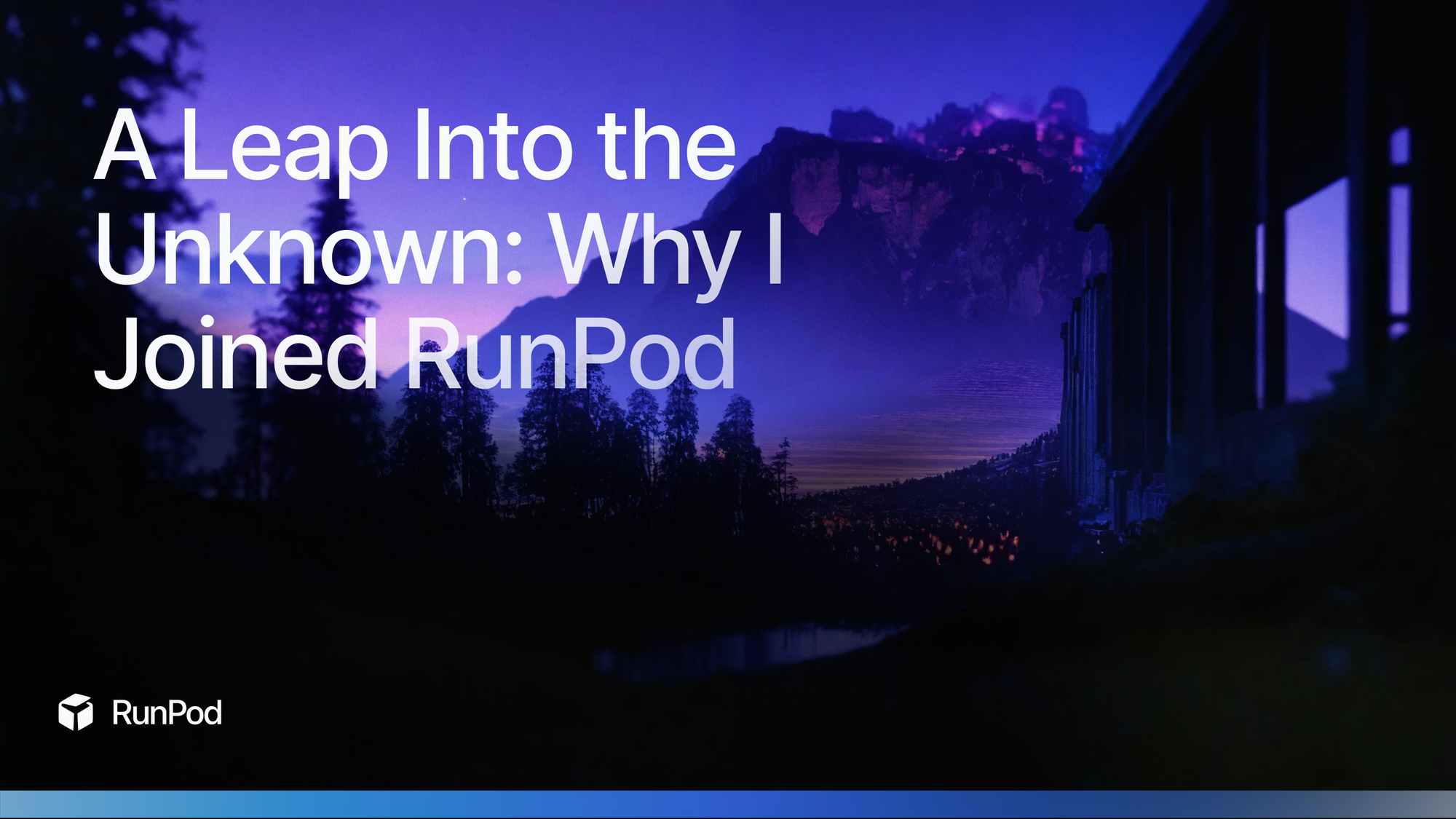A Leap into the Unknown: Why I Joined RunPod

This entry has been contributed by Jean-Michael Desrosiers, Head of Enterprise at RunPod.
I take shots—sometimes far too many, and in wildly different directions. I always have, and it’s been a part of my DNA for as long as I can remember. Picture an overly enthusiastic explorer darting between map coordinates: one moment I’m lifting heavy weights; the next, I’m strumming a guitar in my living room. I’ve sold things, built things, studied pharmacology, launched side ventures, analyzed finances, tinkered with computer hardware, and played with crypto currencies. Heck, I’ve probably tried breaking the world record for most random passions crammed into a single lifetime while I’m at it. You might call it a fear of missing out. I’d rather call it savoring the journey, never getting stuck in a single lane. I’ve come to realize what I truly value, more than any single pursuit, is the chance to forge connections with other human beings—giving a piece of myself to get a piece of their story in return. It’s that exchange, that chance to grow together, that keeps me moving.
That spark is what made me take the biggest shot of all: joining RunPod. In fact, I have been asked on many occasions to describe what it’s like to work here, and I feel it’s important to share my perspective.
Not long ago, I was knee-deep in the pharmaceutical industry, while desperately trying to salvage a side hustle by converting GPU miners into AI servers. I knew next to nothing about SaaS, developers, coding, or machine learning. My life was a bizarre tapestry of experiences, and I wasn’t sure how they all fit together. Then I met Zhen.
He reached out after spotting a contribution I’d made on a server-building community, intrigued by my combination of curiosity, strategy, and unapologetic willingness to learn. Conversations turned into late-night chats, late-night chats turned into brainstorms, and before I knew it, I’d jumped into a completely new world: I joined RunPod as hire number two, joining the company alongside founders Zhen, Pardeep, and Justin.
Now, if you think this is some classic “talent discovered and polished to a shine” tale, think again. This was more like the opening scene of a dark comedy, or perhaps a scene taken from Final Destination. I specialized in pharmaceuticals, sales, and marketing—what on earth was I doing at an AI cloud platform startup? I expected a ramp-up period and then linear growth afterward. Instead, I hit a brick wall. Weeks into my role, I hadn’t closed a single deal. Most customers were frustrated by my lack of technical understanding. The CTO, patient but visibly exasperated, tried explaining the platform’s architecture to me while I nodded blankly, catching maybe 5% of his wisdom on a good day. There was no onboarding process, no playbook, no neat “Getting Started” guide. No HR, no data team, and no process. Each day felt like trying to solve a puzzle while the pieces were still being carved out of raw wood. Days and weeks were passing, without an ounce of success in sight.
Eventually, I asked Zhen: “Aren’t you going to fire me?” I had delivered nothing—just a long list of conversations, all ending in confusion and apologies. But his response still resonates in my ears: “JM, I believe in you, in the person, beyond your current knowledge, beyond your experience. I believe in second chances—and that you deserve one.” It was like he handed me back my own matchstick, daring me to re-ignite my spark. Fire erupting from a volcano. All I needed was that kernel of trust, that moment of faith in my potential, and the possibility ahead to shine.
What followed in the next year laid the foundation of what RunPod is today (John Wick anyone?). We drove tens of millions in sales. We forged powerful strategic partnerships with organizations like OpenCV, one of the most trusted pioneers in computer vision, and vLLM, one of the premier open-source text inference engines. We improved the platform, reimagined pricing, launched a compute management product, deployed a hundred new data centers around the globe, got funded by Dell and Intel, and transformed RunPod’s trajectory. That sense of growth—both in the company and in me—wasn’t linear or tidy, but we pushed through it, leaning on each other in a way that felt more like a band of explorers than just coworkers.

This is what RunPod is about: caring deeply, pressing forward when it’s uncomfortable, learning at a breakneck pace, and celebrating every gritty inch of progress. At RunPod, “courage over comfort” and “giving a shit” aren’t some slogan on a poster—they’re guiding stars. Instead of retreating when things get tough, we grab a flashlight and charge into the dark corners. When someone runs into a problem, they don’t hide it; they broadcast it. Here, problems aren’t stains on a record. They’re opportunities to rally, create, and improve. Need help? You’ll find talented people of all stripes ready to step in. Some are whip-smart data mavens, others are top-tier engineers who solve seemingly impossible puzzles before their morning coffee. We don’t force employees to work in-person; instead, employees forced us to open our first coworking place. We have culture champions who write jingles for any occasion—new job postings, company scorecard results, anniversaries. Imagine logging into a meeting, and the first thing you hear is an impromptu RunPod anthem, strummed on a guitar by someone who also happens to be a genius problem-solver. This might sound quirky, but it’s exactly what makes people grin, sing along, and think: “This place is different.”
And here’s the thing: as RunPod grew, original leaders stepped aside to let world-class veterans come onboard. Nobody quit just because their title changed, though there might have been a heated debate or two. Instead, they refocused on wherever their skills could help the company the most. It’s as if we said, “We’re going to war,” and everyone nodded in agreement, willing to do whatever it takes. We trust each other implicitly. That trust runs so deep that we even had cases like mine: working for a year without a formal contract or any equity paperwork, yet still charging ahead with total faith that it would be made right. And it was.
RunPod’s employees are a lively blend of camaraderie, innovation, and high energy. They may spend evenings playing poker together—folding, bluffing, and laughing at themselves. RunPod employees share ideas fearlessly; they believe brilliance doesn’t need permission, a diploma, or a title to shine. They are relentlessly passionate and always ready to pivot, tackle new challenges, or suggest a daring move that might just redefine what’s possible. They solve problems by mixing data-driven logic (the “red” trait for bias to action) with a collaborative, analytical approach (the “blue” trait for deeper understanding), creating an environment where no good idea goes unexplored.
As we evolved, 80 employees later, we became more deliberate with our resources. We learned to move quickly, sometimes making decisions before we had every data point perfectly squared away. Not recklessly, but boldly, understanding that time is as precious as capital. This mindset trickled down into everything we do, from hiring new talent to launching initiatives. It was never about just getting bodies in the room—it was about attracting extraordinary minds who would thrive in this environment of trust, learning, and iteration.
Looking back, I see a team that refuses to settle. Every week, the whole company sees the scorecard during an organization-wide meeting. We know what’s working and what needs fixing. We celebrate wins with genuine euphoria, and when we stumble, we collectively pick ourselves up—no resentment or finger-pointing. Transparency is our backbone—everyone has visibility into the data that shapes our path. Every employee feels the weight of their decisions and the trust placed in them.
We’re not just building a platform; we’re building what we hope becomes the backbone of AI computing worldwide. We want to give developers, entrepreneurs, and companies a place to do what they do best, free from the friction of infrastructure management. We’re aiming for the stars, and once we make it, RunPod will someday be worth billions. The impact of that vision? It’s exhilarating, like standing at the base of a mountain and realizing you might just have the grit and the gear to reach the summit. We know we have what it takes - we were able to build a profitable product before we even got an ounce of funding, and that is a rarity among startups. But the mountain we need to climb is Everest-sized, and we are just getting started. It’s a matter of scaling– in more ways than one.
For anyone reading who might one day cross paths with RunPod—maybe you’re an engineer who thrives on tough problems, or a growth strategist who knows how to launch a product to new heights—the message here is simple: I took a terrifying leap into the unknown. I stumbled, and fumbled, and worried I’d be cast aside. Instead, I found camaraderie, trust, and a culture like no other that values personal growth as much as it values delivering results. A culture that is unmatched compared to any other one I have ever experienced. From day one, it felt like I’d joined a band of inventors and pioneers rather than just a “company.”
And that’s what has me hooked. After all my detours—through sports, music, sales, hardware, finances, and pharmacology—this journey isn’t defined by the sum of my skills. It’s defined by the people standing beside me, singing jingles in team meetings, going to war in the SaaS industry, and never losing sight of the vision that brought us all together. The point isn’t just to reach a destination; it’s to savor the climb, link arms with those around you, and share something meaningful along the way.
No one can predict the future, but when I look around at RunPod, I feel the hum of potential and possibility. Even though I am a shot taker, it reminds me of why I made that choice in the first place. After all, just like John A. Shedd said, “Ships in harbor are safe, but that's not what ships are built for.” And so, now surrounded by the endless deep in every direction, I’m grateful that I sailed away, appreciative of the opportunities that have afforded to me, and voracious for the ones yet to come.
JM
